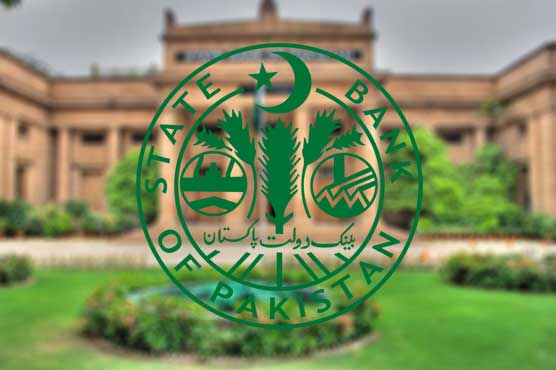SBP keeps interest rate unchanged at 7 percent

MPC was encouraged by the further upward revision in the FY21 growth forecast to 3.94 percent.
KARACHI (Dunya News) – State Bank of Pakistan has kept interest unchanged at 7 percent since last year mostly due to keep growth intact and to help businesses out from the pa pandemic
According to the report of SBP, the Inflation rose to 11.1 percent (y/y) in April, propped up by the lingering impact of this February’s electricity tariff increase as well as a pick-up in month-on-month food prices, partly driven by the usual seasonality around Ramadan.
The Monetary Policy Committee (MPC) noted that supply-shocks to food and energy still dominate, with a small number of energy and food items in the CPI basket accounting for about three-fourths of the rise in inflation since January.
The MPC also observed that although core inflation in urban areas has risen by around 1.5 percentage points during this period, available evidence suggests that demand-side pressures on inflation continue to be relatively contained. This reflects the fact that despite the economic recovery, there is still some spare capacity following last year’s contraction. Second-round effects from the supply shocks are also not visibly apparent: price pressures are concentrated in a few items, wage growth is subdued keeping a cap on costs, and inflation expectations remain reasonably anchored.
As previously forecast, the headline year-on-year inflation rate is likely to remain elevated in the coming months due to the recent electricity tariff hike, pushing the average for FY21 close to the upper end of the announced range of 7-9 percent. As supply shocks dissipate thereafter, inflation is expected to gradually fall toward the 5-7 percent target range over the medium-term.
The MPC noted that financial conditions remain appropriately accommodative. Since the last meeting, market yields have declined in line with the forward guidance provided by the MPC and private sector credit has witnessed a notable uptick, consistent with previous growth upturns. Cumulatively through April, the flow of private sector credit has grown by 43 percent (y/y), led by fixed investment and consumer loans, primarily due to the low interest rate environment and SBP’s refinancing schemes, especially TERF and LTFF.
Since the last MPC, headline inflation has risen further, mainly driven by supply shocks to food and energy, including the lingering impact of February’s electricity tariff hikes. On a sequential basis, upward momentum in certain food prices - notably fresh fruits, vegetables, dairy, poultry, and edible oil - was exacerbated by the advent of Ramadan, more than offsetting the recent decline in wheat prices.
While core inflation has picked up in urban areas, price pressures are concentrated among a relatively confined set of items and spare capacity still exists in the economy.
Inflation expectations also remain reasonably anchored and wage growth is still muted. This suggests that second-round effects of the prevailing supply-shocks to inflation are not manifesting at the moment. As the economy gathers further momentum, it will be important to ensure that food price pressures are reversed through successful implementation of administrative measures to keep second-round effects in check.
Looking ahead, the inflation trajectory will be affected by the path of domestic food and energy prices, this summer’s round of wage negotiations, next year’s budget, and the strength of the on-going economic recovery. As always, the MPC will continue to carefully monitor developments affecting the outlook for inflation, financial stability and growth.
By Harris Zamir

